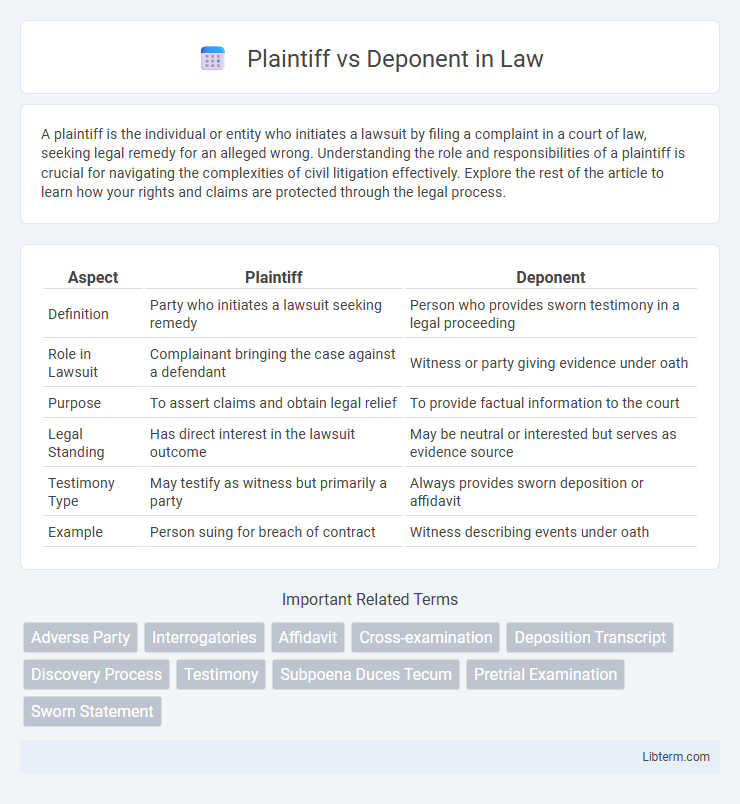A plaintiff is the individual or entity who initiates a lawsuit by filing a complaint in a court of law, seeking legal remedy for an alleged wrong. Understanding the role and responsibilities of a plaintiff is crucial for navigating the complexities of civil litigation effectively. Explore the rest of the article to learn how your rights and claims are protected through the legal process.
Table of Comparison
| Aspect | Plaintiff | Deponent |
|---|---|---|
| Definition | Party who initiates a lawsuit seeking remedy | Person who provides sworn testimony in a legal proceeding |
| Role in Lawsuit | Complainant bringing the case against a defendant | Witness or party giving evidence under oath |
| Purpose | To assert claims and obtain legal relief | To provide factual information to the court |
| Legal Standing | Has direct interest in the lawsuit outcome | May be neutral or interested but serves as evidence source |
| Testimony Type | May testify as witness but primarily a party | Always provides sworn deposition or affidavit |
| Example | Person suing for breach of contract | Witness describing events under oath |
Introduction to Plaintiff vs Deponent
The plaintiff initiates a legal action by filing a complaint to seek remedy for a grievance, while the deponent is an individual who provides sworn testimony during a deposition. In civil litigation, the plaintiff's role centers on presenting evidence and legal claims, whereas the deponent's role is to give factual information under oath. Understanding the distinction between these roles is essential for grasping the procedural dynamics in the discovery phase of a lawsuit.
Defining the Plaintiff in Legal Proceedings
The plaintiff in legal proceedings is the party who initiates a lawsuit by filing a complaint against another party, known as the defendant or deponent, seeking legal remedy for an alleged wrong. This entity holds the burden of proof to establish the defendant's liability by presenting evidence during the trial. Defining the plaintiff involves recognizing their role as the claimant who asserts legal rights and pursues judicial relief in civil litigation.
Understanding the Role of a Deponent
A deponent is an individual who provides sworn testimony during the discovery phase of a lawsuit, answering questions posed by both parties under oath outside of court. The role of the deponent is crucial because their statements can be used as evidence, impacting the outcome of the trial. Understanding the difference between a plaintiff, who initiates the lawsuit, and a deponent, who supplies testimony, helps clarify the procedural dynamics in legal proceedings.
Key Differences Between Plaintiff and Deponent
The plaintiff is the party who initiates a lawsuit by filing a complaint, seeking legal relief or damages from the defendant. The deponent is an individual who provides sworn testimony during a deposition, serving as a witness to gather facts before a trial. Unlike the plaintiff, the deponent may be either a party to the case or a third party with relevant information.
Legal Responsibilities of a Plaintiff
A plaintiff holds the legal responsibility to initiate a lawsuit by filing a complaint that clearly outlines the claims against the deponent. The plaintiff must provide sufficient evidence to establish the burden of proof and demonstrate the deponent's alleged wrongdoing. Failure to fulfill these responsibilities can result in dismissal of the case or unfavorable judgments.
Duties and Obligations of a Deponent
A deponent is legally obligated to provide truthful and complete testimony under oath, fulfilling a key role in the discovery process for both plaintiffs and defendants. The duties of a deponent include answering all relevant questions posed during deposition without evasion, ensuring accuracy and clarity in their statements to avoid misleading the court. Failure to fulfill these obligations can result in legal penalties, including sanctions or contempt of court, emphasizing the importance of honesty and cooperation in judicial proceedings.
Common Situations Involving Plaintiffs and Deponents
Common situations involving plaintiffs and deponents typically arise during civil litigation, where the plaintiff initiates a lawsuit and the deponent provides sworn testimony through a deposition. Depositions serve as a critical discovery tool, allowing plaintiffs to gather evidence, clarify facts, and assess the credibility of witnesses. Disputes often emerge over the scope of questioning, the accuracy of testimony, and the protection of privileged information during these proceedings.
How Testimony Differs from Legal Claims
Testimony provided by a deponent is a factual account given under oath during a deposition, primarily used to gather evidence and clarify details pertinent to a case. In contrast, a plaintiff's legal claim represents a formal assertion of rights or allegations filed with the court seeking remedy or relief. While testimony focuses on presenting facts and personal knowledge, legal claims articulate the legal basis and grounds for the lawsuit.
Impact of Plaintiff vs Deponent Status in Court
The status of Plaintiff versus Deponent significantly influences courtroom dynamics, affecting the burden of proof and testimonial credibility. Plaintiffs carry the responsibility to establish claims with compelling evidence, while deponents primarily provide factual testimony under oath without assuming an evidentiary burden. Courts often scrutinize plaintiff statements more rigorously due to their active role in initiating litigation, impacting case strategy and judicial outcomes.
Frequently Asked Questions on Plaintiff and Deponent
A plaintiff is the party who initiates a lawsuit by filing a complaint, seeking legal remedy or damages, while a deponent is a witness who provides sworn testimony during the discovery phase of a case, typically through a deposition. Frequently asked questions about plaintiffs often involve their rights, responsibilities, and the process of filing a claim, whereas questions about deponents commonly address the scope of testimony, legal obligations during deposition, and how their statements may be used in court. Understanding the distinct roles and legal implications for both plaintiffs and deponents is crucial for navigating litigation effectively.
Plaintiff Infographic

 libterm.com
libterm.com